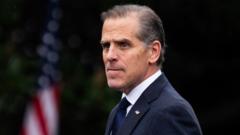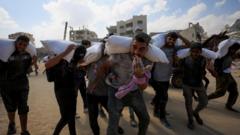The ongoing Israeli-Palestinian conflict sees increasing scrutiny from international allies, who express growing frustration with Israel's heavy-handed military actions in Gaza, prompting discussions around war crimes and humanitarian aid.
Rising Evidence of War Crimes in Gaza: An Analysis of International Responses

Rising Evidence of War Crimes in Gaza: An Analysis of International Responses
As Gaza endures a devastating conflict, mounting evidence suggests war crimes committed by both Hamas and Israel, sparking global condemnation and calls for intervention.
The Israel-Palestine conflict has entered a perilous phase, marked by intensifying evidence of war crimes perpetuated by both sides. Since the Hamas attack on October 7, 2023, Israel has faced mounting criticism from its allies due to the humanitarian crisis unfolding in Gaza.
Israeli Prime Minister Benjamin Netanyahu, previously focused on managing tensions with the Palestinians, now grapples with a more complicated landscape as he realizes the repercussions of his and his administration’s previous decisions. His longstanding commitment to oppose Hamas has not wavered, yet his efforts to engage with other Middle Eastern powers have become overshadowed by the current crisis. While navigating allegations of negligence in defense readiness before the October attack, the Prime Minister's reluctance to launch an independent inquiry into the lapses only adds to the dissatisfaction.
The scale of the humanitarian disaster in Gaza is staggering. Reports indicate tens of thousands of civilian casualties due to military actions, alongside allegations of deliberate starvation and destruction of vital resources. As international journalists struggle to access the territory amid bans on coverage, local reporters continue to risk their lives to bring the truth to light, with nearly 200 killed while documenting the crisis.
Simultaneously, reports confirm that Hamas's actions during and after the initial invasion involved significant war crimes, including the murder of civilians and taking hostages. The extent of these crimes has drawn attention from international legal bodies, including the International Criminal Court, which has issued arrest warrants against key Israeli leaders. The Israeli government dismisses these claims, characterizing them as unjust and antisemitic narratives aimed at discrediting their national security measures.
Pressure on Israel continues to build as its historical allies, including the United States, grow increasingly critical of its approach, particularly after a joint condemnation with Canada, the UK, and other nations highlighted the catastrophic humanitarian conditions. Calls for immediate action grow louder, with many in the UK Parliament advocating for the recognition of a Palestinian state, a move that could shift the dynamics of international relations in the region.
As the Israeli Knesset nears its summer recess, Netanyahu faces internal challenges from nationalist factions that oppose any ceasefire negotiations. The political landscape in Israel is becoming increasingly volatile, with the possibility of impending elections and threats to his leadership.
In light of the severe humanitarian crisis, a ceasefire now stands as a critical path towards alleviating civilian suffering and negotiating the release of hostages held by Hamas. Yet, the specter of continued conflict looms, emphasizing the urgency for a pivot from military operations to diplomatic engagement. The present circumstances present an unprecedented opportunity for renewed dialogue, yet the road ahead remains fraught with challenges as the conflict enters a crucial juncture.



















